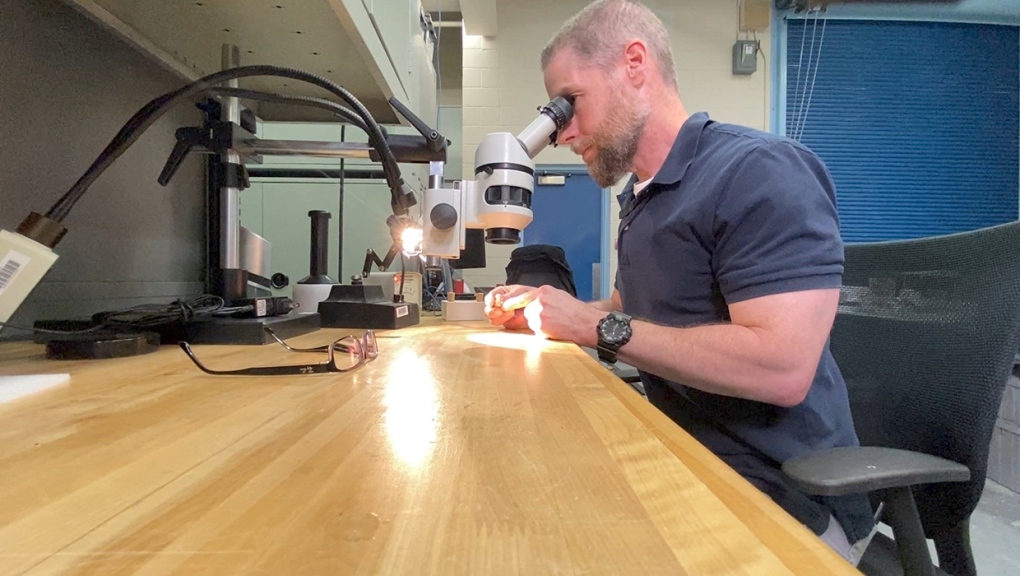Royal Tyrrell researchers exploring fossils of previously unknown early primates
In the back halls of the Royal Tyrrell Museum of Palaeontology, flanked by shelves of huge fossils the likes of triceratops, and albertasaurus, Craig Scott peers through a microscope at the tiny jawbones of a pair of previously-unknown species of early primates.
"The mammalian fossil record is dominated by teeth because enamel resists the processes of fossilization. So, in a way, we're paleo-dentists, we study teeth a lot," said Scott, who is the Tyrrell Museums’s director of preservation and research.
“These species, along with all of their relatives occur very, very low in the primate family tree. They were an early branch, and several of them were, I guess, "interesting evolutionary experiments" would be the best way to put it, in that they existed for a certain period of time and went extinct.”
The prehistoric primates Scott is studying were not ape-like primates. Rather, they were tiny - the size of a large rodent - and looked something like small lemurs.
“They probably didn't have forward-facing eyes. Their eyes faced a little bit more laterally to the sides, like you'd see in tree squirrel, for example," said Scott.
“Their brains were not particularly enlarged compared to their body size, and they probably did have various features (like hands, ankles and fingers adapted for grasping braches) that allowed them to live in trees.”
 Craig Scott, from the Royal Tyrell Museum of Palaeontology in Drumheller, Alta.
Craig Scott, from the Royal Tyrell Museum of Palaeontology in Drumheller, Alta.
FOUR SITES IN CALGARY
The fossils were only recently identified as a new species of primate, even though they were discovered between the 1990s and early 2000s, at four sites in the Calgary and Cochrane area. Those include a site in Calgary's Edworthy Park, and one in Glenbow Ranch Provincial Park which are reflected in the names Scott gave the new species: “Edworthia Greggi” and “Ignacius Glenbowensis”
The other two locations include an exposed cut bank along West Nose Creek in northwest Calgary and a rail line right of way on the eastern edge of Cochrane.
Even though the animals eventually went extinct Scott says the discovery of the new species helps fill a gap the understanding of human evolutionary history.
“As human beings, we have a vested interest really, in understanding about the evolutionary history of our lineage," Scott said. "Although these things may seem so distant and remote from that, they represent parts of the very beginnings of human beings, really. So, if you have any interest whatsoever in the in the evolution of humans, and primates, more generally, these will be very important.”
DIFFERENT CLIMATE
The discovery also bolsters the idea of western Canada and even the high Arctic having a much different climate and landscape in the distant past.
“It suggests that it was a very interesting ecosystem that was quite different from what we see today. The climate back then, was something that you would see in present day Louisiana or maybe the Everglades," said Scott.
“We're talking about subtropical environment, lots of rainfall, humidity, the landscape is populated by lush forests, adjacent to rivers and streams.”
 The new primates have been given the names “Edworthia Greggi” and “Ignacius Glenbowensis."
The new primates have been given the names “Edworthia Greggi” and “Ignacius Glenbowensis."
WASHED AWAY
The sites from which Edworthia Greggi and Ignacius Glenbowensis were discovered were washed away in the 2013 flood, but Scott expects many more early primate fossils to be discovered, in the future, all across Alberta.
"All the work that's been done previously, really has only scratched the surface," said Scott
"Given the amount of rock that's in the province, and its very well-established, fossil history, we almost certainly will be encountering new species in the future."
If you discover a fossil, or what you think, may be a fossil, don’t dig it up and take it home. if you do that, you could be breaking the law.
Instead photograph it, carefully note the location, and contact the Royal Tyrrell Museum. https://tyrrellmuseum.com/research/found_a_fossil
CTVNews.ca Top Stories

Celine Dion delivers stirring comeback performance at Paris Olympics opening ceremony
Against the rainy Paris night sky, Celine Dion staged the comeback of her career with a powerful performance from the Eiffel Tower to open the Olympic Games.
Jasper wildfire: 'Several weeks' before residents can return, premier says
Premier Danielle Smith said Friday afternoon in Hinton while weather conditions are cooler, the Jasper fire is still considered out of control and that Jasper residents can expect to be away from their homes 'for several weeks.'
Missing 3-year-old boy found dead in creek in Mississauga: police
A three-year-old boy has been found dead a day after he went missing in a park in Mississauga, Peel police say.
Irish museum pulls Sinead O'Connor waxwork after just one day due to backlash
An Irish museum will withdraw a waxwork of singer-songwriter Sinéad O'Connor just one day after installing it, following a backlash from her family and the public, it told CNN in a statement on Friday.
Winnipeg senior's account overdrawn for $146,000 water bill
A Winnipeg senior is getting soaked with a six-figure water bill.
Turpel-Lafond won't sue CBC over Cree heritage report that took 'heavy toll': lawyer
The lawyer for a former judge whose claims to be Cree were questioned in a CBC investigation says his client is not considering legal action against the broadcaster after the Law Society of British Columbia this week backed her claims of Indigenous heritage.
Driver charged after flashing high beams at approaching police
Orillia OPP arrested and charged a driver with impaired driving after flashing their high beams.
Major Canadian bank experiences direct deposit outage on payday
Scotiabank says it has fixed a technical issue that impacted direct deposits on Friday morning.
Health Canada warns some naloxone kits contain false instructions
Health Canada is warning some take-home naloxone kits come with bad instructions that should be ignored in favour of the correct guidance.
































